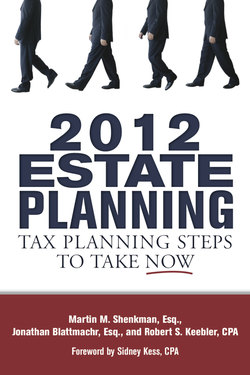Читать книгу 2012 Estate Planning - Martin Inc. Shenkman - Страница 50
На сайте Литреса книга снята с продажи.
Capital Gains Rates
ОглавлениеThe 2001 Act (EGTRRA) created low capital gains tax rates of 0 percent for taxpayers in the 10 percent and 15 percent income tax brackets, and 15 percent for others. These rates continue through the end of 2012 but, unless Congress acts, will expire in 2013. If you anticipate higher capital gains rates, look into diversifying concentrated positions now by selling in 2012 before rates are increased in 2013. Obviously, those strategies are not assured to be successful given the political uncertainty. If you don’t act in 2012, and capital gains rates do rise in 2013, then the use of a charitable remainder trust (CRT) to soften the income tax blow on diversification of a concentrated stock position could be considered.
There has also been discussion of reducing the tax-favored treatment for capital gains over a number of years to minimize the impact on the markets. This might take the form of higher rates on those earning over certain income thresholds. The $200,000/$250,000 thresholds that have popped up in a number of contexts might be the threshold selected for such changes.
The combination of higher capital gains rates coupled with the Medicare tax on unearned income (see the discussion that follows), and other potential changes, could have a surprising impact on taxpayers. For taxpayers in high-tax states who face a higher combined capital gains rate, coupled with Medicare tax on investment income and no federal deduction for state income taxes on the gains realized, the bottom line result could be quite costly.
There has even been some discussion of treating capital gains and qualified dividends as ordinary income. The sales pitch for this is it will simplify the tax code and planning. Since the marginal tax rates will be relatively low, perhaps this might be saleable. In fact, all those rates were the same for a short time after 1986. But the naysayers are concerned about the impact on the nascent economic recovery.
The proposed changes could have a wide-ranging impact on a host of investment, business, and other transactions. Depending on the nature of the various changes, they could distort investment and planning decisions in many ways from what taxpayers and advisers alike are presently use to. Dealer versus investor status, lease versus sale, hedging transactions, holding periods, and a host of other planning concepts could all require reconsideration in the new tax paradigm.
